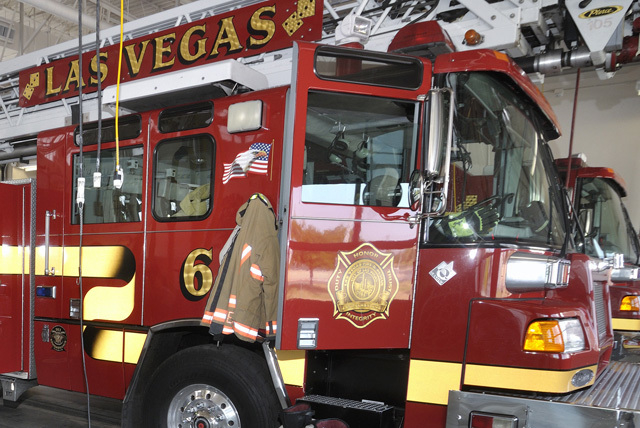Las Vegas hits back at ambulance company complaints
The city of Las Vegas is pushing back against a report about its ambulance service commissioned by ambulance provider American Medical Response that concludes the city Fire Department has a higher rate of transporting patients to hospitals when they are from wealthier neighborhoods.
City Manager Betsy Fretwell issued a 9-page report that contradicts the conclusions of AMR’s report, which was completed by Applied Analysis, a consulting firm that is well respected in public policy circles. The city’s rebuttal, released Monday, attempts to cast doubt on the report’s methodology. For example, the city notes the 89110 ZIP code analyzed in the AMR report includes some unincorporated Clark County not served by the Las Vegas Fire Department.
However, Jeremy Aguero, a principal in Applied Analysis, dismissed the city’s critique as “inaccurate.”
“We only looked at city of Las Vegas responses,” he said. “We did not include any county responses.”
The conflicting reports come at a time of tension between American Medical Response and the city. A new hospital transport policy started on March 3 by Fire Chief Willie McDonald switched from an automatic dual response of both the Fire Department and AMR units to the Fire Department only dispatching AMR when it decides the ambulance is necessary.
Under the former dual response system, the Fire Department responded to all emergency medical calls but only transported a patient to a hospital about 30 percent of the time, while AMR took 70 percent.
The fire chief he said he wants to increase the city’s share of hospital transports to 75 percent, with an immediate goal of 50 percent. The department now takes about 43 percent.
Both the city and AMR charge for transports, so their market share — and how much they can collect from patients or insurers — determines how much money they make.
Geography wasn’t the only point of contention between the city, AMR and its consultant. For example, AMR reported, based on its data of 169 calls in March, a delay of 9 minutes and 26 seconds after an initial 911 call before the ambulance provider is called.
The AMR report also found an 839 percent increase in delayed dispatch notifications comparing February to March, the month the city’s policy started. That’s an increase from 18 calls with a delayed dispatch notification to 169 calls.
The city report said AMR “alleges the patients in Las Vegas are experiencing delayed response times since March 3,” but it concluded Las Vegas Fire Department response times were quicker in March, April and through May 12 in comparison to February.
Aguero said the Fire Department’s promptness isn’t an issue — the delay has been in calling AMR since the city’s new policy took effect.
The city report, citing unspecified local media reports, said AMR alleges that the Fire Department doesn’t respond at night, and called that untrue. Aguero said his report never said anything about nighttime calls.
The city said AMR’s services have been requested with no response 288 different times since March 3, and 475 times since Jan. 1.
Aguero said that’s new information, not a response to anything in his report. AMR officials didn’t immediately address that point, saying they hadn’t had a chance to review the full city response.
AMR spokesman Ron Cunningham said the company is confident in the earlier report’s conclusions.
“We stand behind the report,” he said. “We feel it’s accurate and representative of what’s been happening in Las Vegas since March 3,” he said.
He said the ambulance provider objects to the fire chief’s new policy, and doesn’t have a problem with department personnel.
“We’ve been very vocal about our support for the Las Vegas Fire Department and the men and women that work there.”
Contact Ben Botkin at bbotkin@reviewjournal.com or 702-405-9781. Follow @BenBotkin1 on Twitter.

















